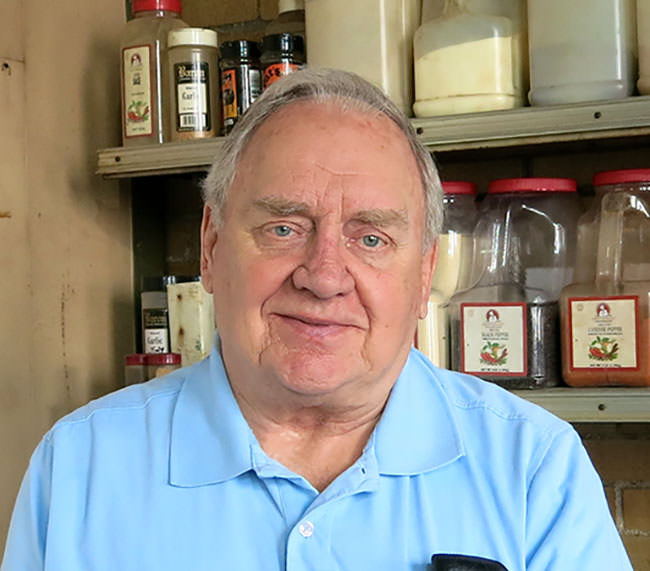
What was your best day as a sausage maker? The day we got to make the sausage for the Pope. He said our sausage was the thing he remembered the most. That’s one of the better feelings that you have – to know that what you are doing is acceptable for not only past generations but for future generations as well.
1. What led you to the mission of being a sausage maker?
I was going to school and was going to be a veterinarian. I went to 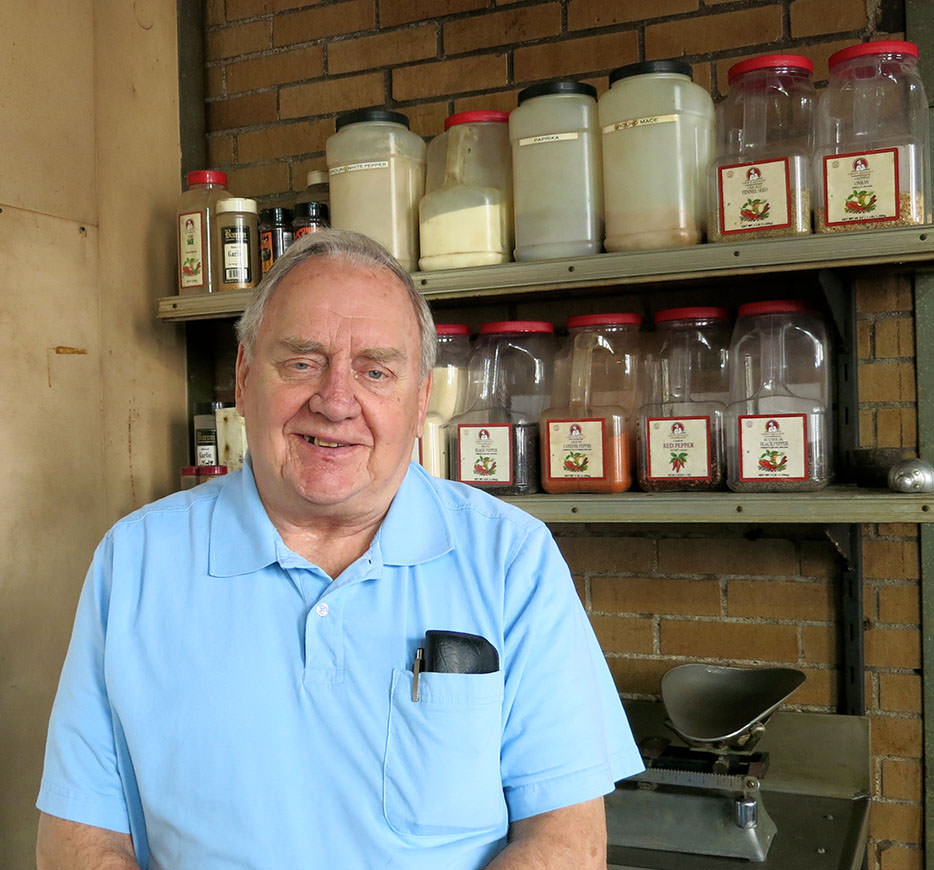 junior college. When I was transferring over to go to regular college, my dad had bought this building in 1957. He needed a lot of help. He asked me to not go to school for a year and come and work for him and later on come back to school. I said, “Yes, that is all right. I can do that.” Well, guess what. Here I am still working at the store fifty-seven years later. I never did go back to school. That’s how I got into the sausage business.
junior college. When I was transferring over to go to regular college, my dad had bought this building in 1957. He needed a lot of help. He asked me to not go to school for a year and come and work for him and later on come back to school. I said, “Yes, that is all right. I can do that.” Well, guess what. Here I am still working at the store fifty-seven years later. I never did go back to school. That’s how I got into the sausage business.
2. What does this mission mean to you?
We’ve had the same customers who have passed it down to their families. They keep coming back. It’s like a tradition. I’m carrying on a tradition that we have had since 1940 – the kind of sausage we make. It’s been the same stuff. We’ve added other stuff since then, but it has been our tradition to have the same stuff we had in 1940 –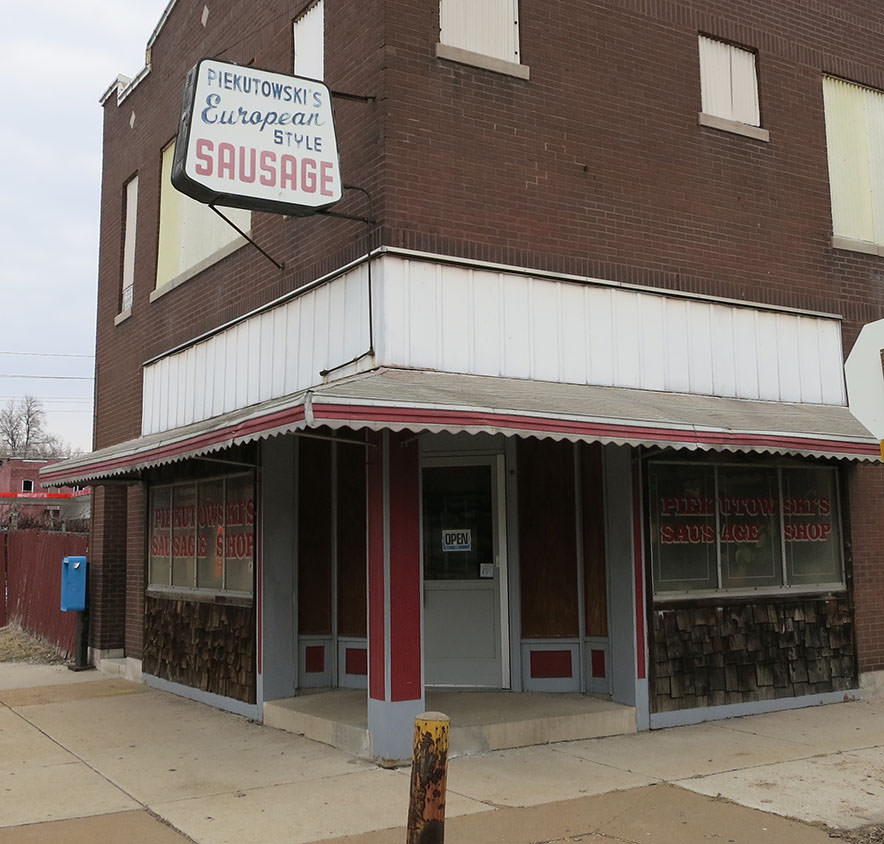 we’ve still got it now and have made it almost the same way – as close as we can. Some things have changed, the meat changes, different things change, but we’ve tried to stay just as we were then.
we’ve still got it now and have made it almost the same way – as close as we can. Some things have changed, the meat changes, different things change, but we’ve tried to stay just as we were then.
We have a homemade product. We do sell to Dierbergs and Schnucks and groceries like that. Over the years we depended on our store. But as the neighborhood has changed, we never wanted to move out. In order to sustain our self, we’ve moved to distributing to different outlets and things, put it in delis and people are happy. They can get it closer to home. It is the Piekutowski Sausage.
When my dad was younger in 1940 he was working as a sheet metal worker at a hardware store up the street from the sausage store. He 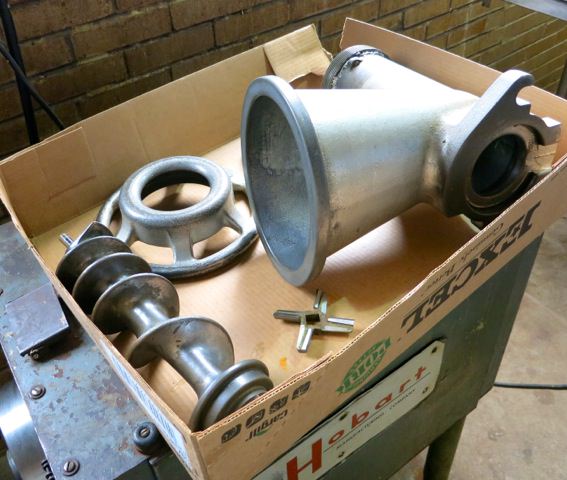 had put in a furnace in a building on Thursday and Friday. They didn’t get the job done. The boss told him, “Ted, you gotta come in Saturday and finish that job.” My dad said, “No, I’m not coming in Saturday. I got something to do Saturday.” His boss told him, “I’ll tell you what. If you don’t come in Saturday and finish that job, you don’t have a job.” So my dad said, “Well, I ain’t got to job.” My dad walked out.
had put in a furnace in a building on Thursday and Friday. They didn’t get the job done. The boss told him, “Ted, you gotta come in Saturday and finish that job.” My dad said, “No, I’m not coming in Saturday. I got something to do Saturday.” His boss told him, “I’ll tell you what. If you don’t come in Saturday and finish that job, you don’t have a job.” So my dad said, “Well, I ain’t got to job.” My dad walked out.
Three or four stores from the shop, my dad walked by the sausage shop. The owner was out there and saw my dad. The owner said, “Ted. What’s the matter? You don’t look too good.” My dad said, “Ha. I just lost my job.” The sausage storeowner said, “Well, I tell you what Ted. Why don’t you come to work for me? I work this place all by myself and I could use somebody to help me.” My dad said, “OK. I could do that.”
So my dad came in there and little by little this guy taught my dad how to make sausage. The old timer would put a hand full of this 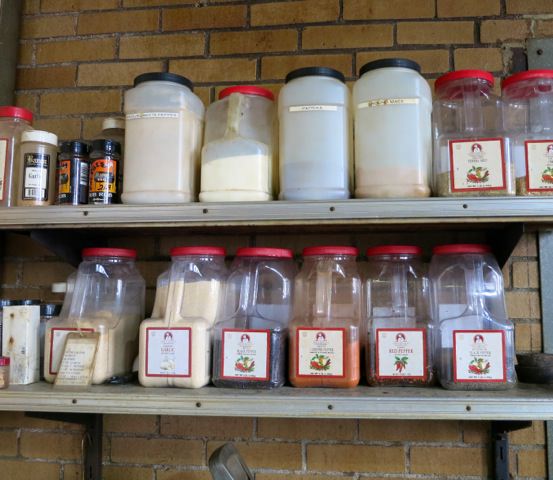 and a hand full of that, and this and that in the recipe. My dad said, “Look. If we are going to both make the same thing, we’ve got to make something uniform here.” So my dad started weighing everything here and made an actual formulation for the sausage. You knew what you were putting in there. So if you put it in or he put it in, it was always the same.
and a hand full of that, and this and that in the recipe. My dad said, “Look. If we are going to both make the same thing, we’ve got to make something uniform here.” So my dad started weighing everything here and made an actual formulation for the sausage. You knew what you were putting in there. So if you put it in or he put it in, it was always the same.
Then a couple of years went by and the owner died. The owner had left the sausage store to my dad. My dad got the business in 1940 and that’s how he started. That’s how it all came about. Over the years my dad worked and then his brother started working with him. They had a couple of older ladies that would trim the meat. The original building got so old and it was hard to maintain a sanitary condition, so we moved to the present location here on Florissant.
3. What was your best day as a sausage maker?
The day we got to make the sausage for the Pope. That was the biggest thrill of our life. It involved everybody. That was the biggest moment we’ve ever had. We’ve made sausage for different people, politicians, Stan Musial, and different people. But I think the Pope would be the one that I could say would be the best one. It’s a lot of pride of what happened. I was glad he knew us and remembered us 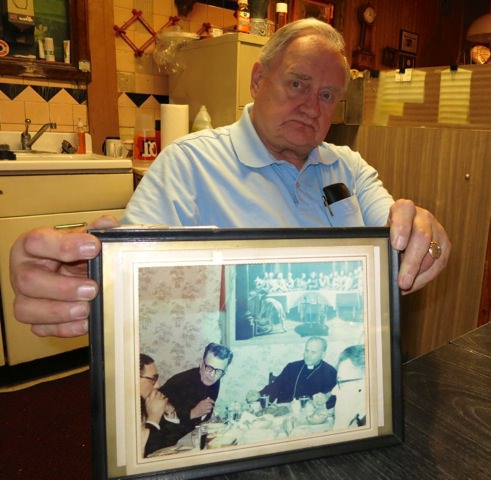 from 1969 when he came back in 1999. He said our sausage was the thing he remembered the most. There must be something to make it outstanding.
from 1969 when he came back in 1999. He said our sausage was the thing he remembered the most. There must be something to make it outstanding.
In 1969, Pope John Paul II (then a Cardinal) was here in St. Louis to try to get money for the church in Poland. He lived in Poland at that time. He was here visiting different Polish communities in the United States. He came to the Polish church downtown, St. Stanislaus, (Kostka Polish Catholic Parish, St. Louis, Missouri) to try to get money for the people over there in Poland.
He was there and the housekeeper at that time come to our store. She got sausage and that and made it at the meal for him. It was the Polish sausage. Right before he was ready to come to St. Louis in 1999, some people from St. Louis were in the Vatican for one of them visits they have and they did get to talk to him. They asked him if he was coming to St. Louis and what was the thing he remembered most about coming to St. Louis. He said, “I remember that sausage I had at that church down there and it was the best I ever had – better than even in Poland.”
They come back to town and somehow it got in the paper and all that. They wrote big articles about the Pope liking our sausage and 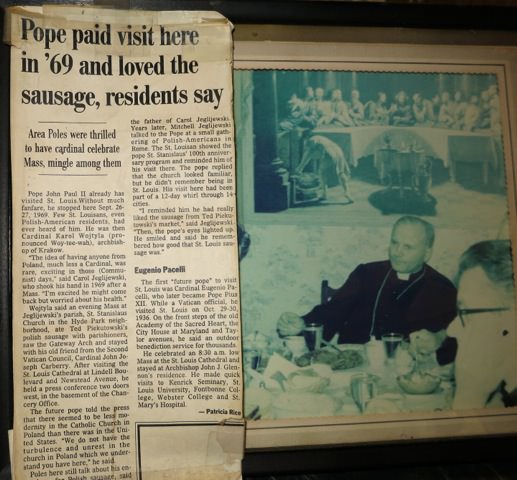 all kinds of stuff – what the Pope had said, what sausage he like, and all that. The Catholic Church puts out a paper called the St. Louis Review. It comes out once a week. The nuns who do the cooking over there at the Rectory where they stay on Lindell over there where he was going to be, they wanted to find the people that made the sausage when he was here in ’69. I saw the article and I said, “That’s us!” So I called them up. I says, “Well, we’ll do the same thing for him again. We’ll take care of him when he gets here and all that.”
all kinds of stuff – what the Pope had said, what sausage he like, and all that. The Catholic Church puts out a paper called the St. Louis Review. It comes out once a week. The nuns who do the cooking over there at the Rectory where they stay on Lindell over there where he was going to be, they wanted to find the people that made the sausage when he was here in ’69. I saw the article and I said, “That’s us!” So I called them up. I says, “Well, we’ll do the same thing for him again. We’ll take care of him when he gets here and all that.”
So we made sausage and everything. We got it over to their place. At that time he was getting pretty sick and wasn’t able to keep up with everything they had planned. But in the afternoon they had planned a luncheon with all the priests and Cardinals here in St. Louis. He 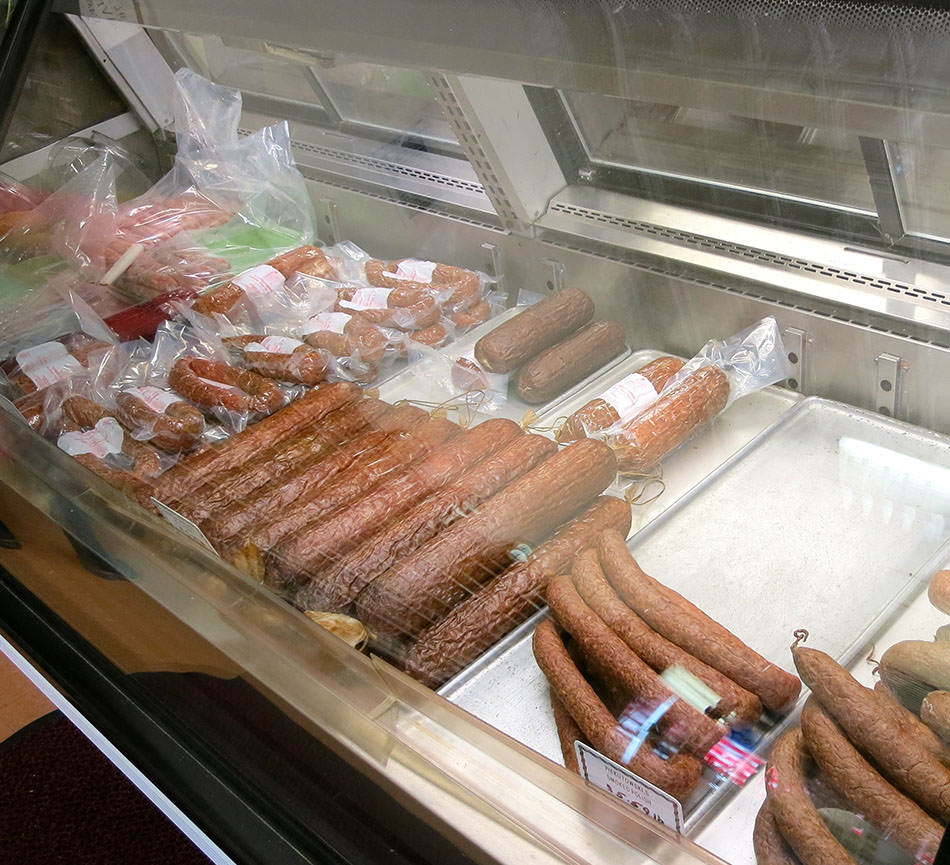 wasn’t able to keep it. They were going to serve that sausage at that luncheon. They had a whole bunch of sausage left there – a lot of stuff they didn’t eat. So there was a Monsignor in charge over there at the building itself. His name was Monsignor Stika. Monsignor said that the morning after Pope John Paul II left and went back to Rome, Monsignor went down to the kitchen and was going to fix some of that leftover Polish sausage with some eggs and stuff. He said it was all gone! They packed up all the boxes and stuff and took it back to their airplane and took it back to Rome.
wasn’t able to keep it. They were going to serve that sausage at that luncheon. They had a whole bunch of sausage left there – a lot of stuff they didn’t eat. So there was a Monsignor in charge over there at the building itself. His name was Monsignor Stika. Monsignor said that the morning after Pope John Paul II left and went back to Rome, Monsignor went down to the kitchen and was going to fix some of that leftover Polish sausage with some eggs and stuff. He said it was all gone! They packed up all the boxes and stuff and took it back to their airplane and took it back to Rome.
It got us a lot of publicity over all that – being on Good Morning America, people calling up over here from different countries and wanting to know all about it, a guy from France calling me from home and wanting to interview me, and all kinds of stuff. For Good Morning America, they were there and we were here and we were talking back and forth with the camera and all that. We had to send them stuff. It got us a lot of publicity!
4. What was your worst day as a sausage maker?
In our business we are under government inspection. If you don’t pass one of your tests — that would be one of the worst things. One 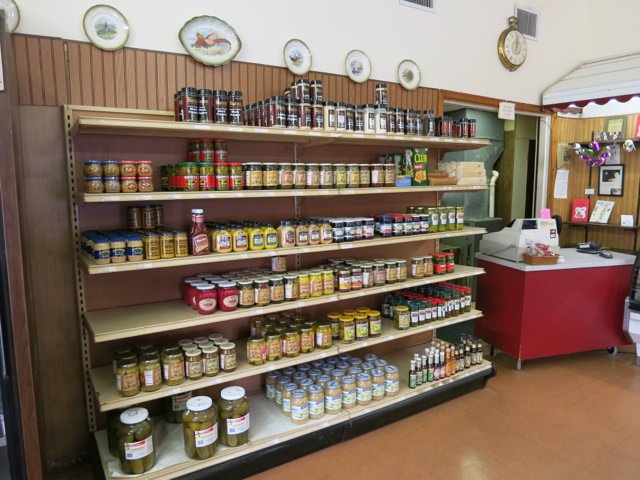 time at the busiest time of the year, we had a product that didn’t quite meet their test. It was close to Christmas and we had to issue a recall. That was the worst time we ever had. That was only one time in all the years I’ve been making sausage since 1940 – 74 years. That would be one of the worst times one could ever have. It wasn’t really that bad because it was only one certain batch. We didn’t have any problem. There was no problem because people cooked it thoroughly. But we issued the recall. People called up and they said, “We didn’t have any problems. Everything is fine with us.”
time at the busiest time of the year, we had a product that didn’t quite meet their test. It was close to Christmas and we had to issue a recall. That was the worst time we ever had. That was only one time in all the years I’ve been making sausage since 1940 – 74 years. That would be one of the worst times one could ever have. It wasn’t really that bad because it was only one certain batch. We didn’t have any problem. There was no problem because people cooked it thoroughly. But we issued the recall. People called up and they said, “We didn’t have any problems. Everything is fine with us.”
5. How did you survive your worst day?
You just carry on the best you can and just keep charging along. You try to make the best of it and do what you have to do to correct your problems or whatever. You make every day a good day. Sometimes 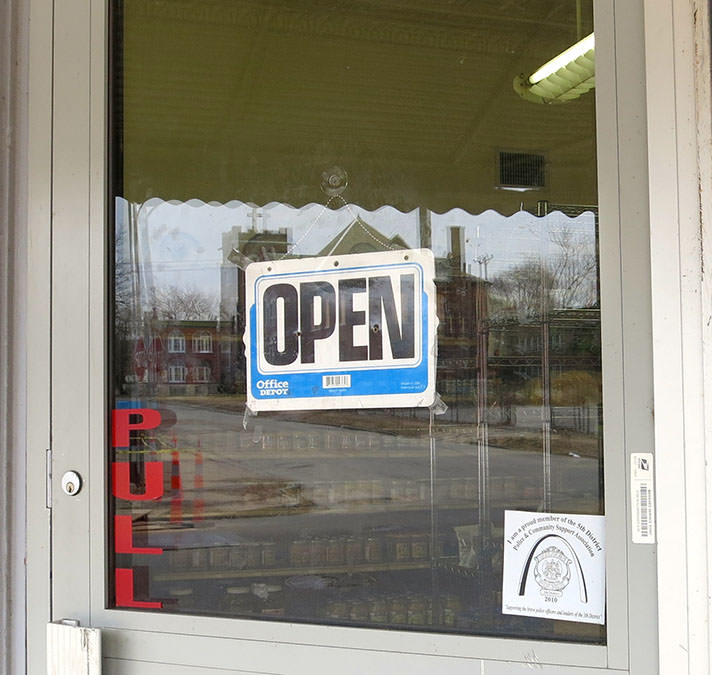 you have bad days. Everybody has bad days. You might come in and the help doesn’t show up. Somebody might be sick. You make due. You can always make due. We do.
you have bad days. Everybody has bad days. You might come in and the help doesn’t show up. Somebody might be sick. You make due. You can always make due. We do.
Most of us are family that works here. I’ve got a daughter that works here. I have a grandson that works here. My brother is the other partner in the business. He works here. My wife works here. There is a neighborhood fella that works here. That’s it. It’s just a small operation. But it is a family type of affair. Everybody is a big family. That’s how we keep it family. We are able to make everybody happy. We’re here doing things the way we have done it before and we want to continue doing it – keeping things the way they have always been. That’s what makes people keep coming back. They know what it is like. They say, “Well, I used to come there with my grandpa” or “I used to come in here with my dad and now we’re coming down with our kids.” That’s the kind of thing that makes you feel good – when somebody knows that they are coming back and back and back and the generations just keep going on and on and on. That’s one of the better feelings that you have – to know that what you are doing is acceptable for not only past generations but for future generations as well.
- « Previous person: Cassie Strom
- » Next person: Otis Woodard